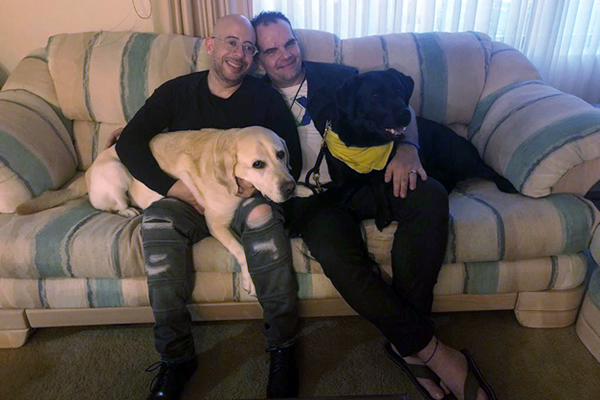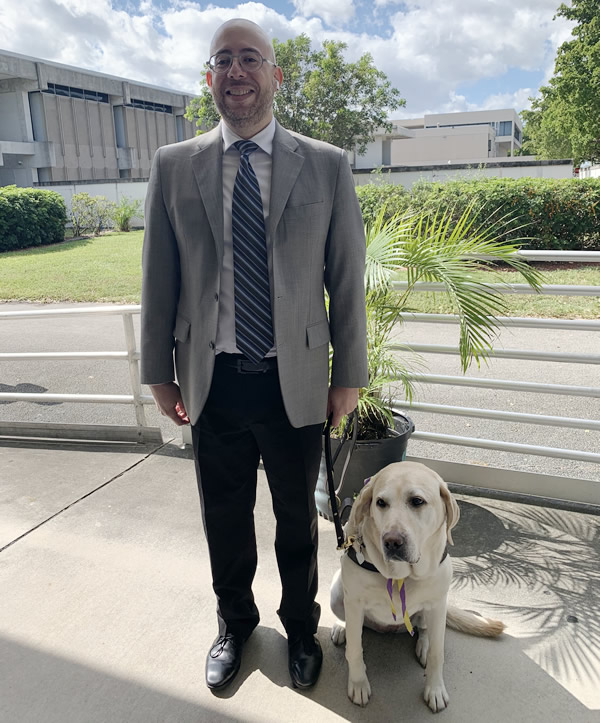This article appears in on The Washington Blade.

If you ask Gabriel Lopez Kafati, 43, if he’s out, he’ll tell you about his tattoos. One, above his shoulder, is a rainbow-colored equality sign. The tattoo on his right leg is the word “aequalitas” (the Latin word for “equality.”). In another tattoo, his first name is in Braille. “On my lower back, there’s a heart with an error,” he said in a phone interview, “the rest is best left to your imagination.”
Lopez Kafati is one of the members of the LGBTQ community who are queer and blind or visually impaired. There have always been people who are LGBTQ and blind. Yet, in telephone interviews, they told the Blade, they often feel “unseen” in the queer community.
(This reporter is queer and visually impaired.)
Twenty years ago, Blind Friends of Lesbians and Gays (BFLAG), became an affiliate of the American Council of the Blind (ACB), an advocacy group. In 2009, BFLAG’s name was changed to Blind LGBT Pride International (BPI).
Here are the stories of some of the people who have found their tribe in BPI.
BPI’s vice president, Leah Gardner, 44, who is lesbian and blind, lives in the Bay Area in California. “I grew up in a conservative part of New Hampshire,” Gardner said in a phone interview. “I came out as lesbian to my friends when I was 17.”
But, she didn’t come out about being blind until after she graduated from college. “I was mainstreamed in school,” she said, “I didn’t know a lot of other blind kids growing up.”
Gardner’s attitude began to change when she took a self-defense class and became friends with some of the other blind students. She went to her first ACB convention with them.
At the convention, there was a meeting of a group of LGBTQ blind people. They had the same dating woes and fears that Gardner had. “I was in a room with other queer blind people! I’d come home.”
People in the queer community are happy to see blind people as friends, but not as sexual, she said.
The Internet and social media have helped blind people connect to the LGBTQ community, Gardner said. But, “there’s still a chasm in terms of romance!”
Sarah Chung, 31, who’s queer and visually impaired, graduated from Adler University with a master’s degree in counseling in 2019. She was set to compete in judo in the Paralympics in Tokyo this summer. But, because of COVID-19, the Paralympics was canceled. Due to the pandemic, she hasn’t been able to find a job in counseling.
“It’s not easy,” says Chung, who uses a screen magnifier and “voice over” to read the screen on her phone, “employment’s so important.”
As a child of Korean parents, Chung found a hero in Margaret Cho. Chung, who identifies as non-binary came out recently to her Mom. Before that, she’d reached out to Asian-American, Pacific Islander Pride organizations. “They were incredibly helpful,” Chung said, “I’d no idea there were other queer Asian-Americans.”
Being queer and visually impaired made her feel somewhat alone. But, Chung said, “a friend invited me to join BPI.”
Since then, she’s met other LGBTQ blind people on BPI’s podcast “Pride Connection.” “It was great to meet folks from all over the nation,” Chung said.
How the queer community reacts to your being blind depends on the time, place and who you’re with, she said. Chung finds that LGBTQ bars can be disorienting if you’re blind. Because you can’t see non-verbal interactions or hear what people say over loud music.
“In bars, I’ll text my friends,” Chung said, “some view that as being uninterested. But, I’m doing that to get more information [about the surroundings and the people who are there]. To see through the eyes of my friends.”
Over the years, BPI has advocated on behalf of queer, blind people. The group urged the Library of Congress’s National Library Service for the Blind and Print Disabled to add an LGBTQ+ category to “talking books.” (The category was added to the Library’s main catalog in 2019 and appeared on BAARD, the program’s mobile app last summer.)
Blind people are vulnerable during the pandemic, BPI president Lopez Kafati said. If you’re blind, you can’t drive to get a COVID-19 test. If you’re visually impaired, you’ll need assistance if you go to get groceries.
To help blind people tell the media their pandemic stories, BPI developed Storytelling Camp. “We’re training them to make their points effectively,” Lopez Kafati said.
But BPI isn’t all work. It’s also for socializing and, sometimes, for romance.
Anthony Corona and Lopez Kafati met at a BPI mixer at ACB’s convention in 2019. The two have been together ever since.
Lopez Kafati, 43, was born in Honduras. He knew he was gay when he was in his mid 20s, but wasn’t fully out until he was 32. Lopez Kafati went to law school and worked as an attorney. But he began losing his vision from retinitis pigmentosa, a progressive eye disease. “I was convinced that I was the only person who was blind and gay in the world,” Lopez Kafati said.
He Googled “blind and gay.” “And BPI popped up,” he said. “It was life changing to find others who shared my experience.”
He came to the United States to enter rehab in Miami so he could learn to travel, work, and live independently as a blind person. Lopez Kafati earned an MBA from Barry University, and in 2015 he became a U.S. citizen. Today, he manages accommodations for students with disabilities at Miami Dade College.
“Often, gay people know so little about blindness,” Lopez Kafati said. “They think we can’t have sex!”
Gay men communicate so much non-verbally – through a wink or a nod – and he can’t see to respond. This makes Lopez Kafati feel excluded from the gay community.
“Gay friends almost make me feel like I’m charity,” he said, “like I have a gay blind friend who I help shopping. Not like, here’s a guy I want to date.”
When he went to his first ACB convention in 2012 and met other queer, blind people in the BPI suite, Lopez Kafati said to himself, “I’m home!”
Corona, 45, worked for the Associated Press for 10 years – on its East Coast arts and culture desk and later as an editor in its entertainment bureau. In 2011, he was in a white rafting accident. In March 16, he lost his vision 20 days after he contracted shingles. He was devastated by his loss. “I had to go through grief,” he said in a phone interview, “I’d enjoyed journalism. My life was good. Honey, I wasn’t lonely on any night!”
There were days when he didn’t want to live. Corona didn’t think there were other gay, blind men out there. He sought counseling. His love of life came back when he went to guide dog school and got Boaty, his guide dog. “He was born to guide!” Corona said.
Like others interviewed by the Blade, Corona says that many in the queer community don’t want to date blind people. Once, as an experiment, he went on a dating app. “When I didn’t disclose my blindness, I got hit up many times within an hour,” he said, “when I disclosed, I was lucky to get hit up even once in a day.”
Sometimes things, even sad things, happen for a reason, Corona said. On March 24, 2016, his vision was completely lost. On the same day, his father died. For three years, he spent every March 24 sobbing. But that changed after he and Lopez Kafati became a couple. “Gabriel’s birthday is March 24,” Corona said. “Now, I’m sad on the anniversary of the worst day of my life. But I’m happy because I’m celebrating the birthday of the love of my life!”
